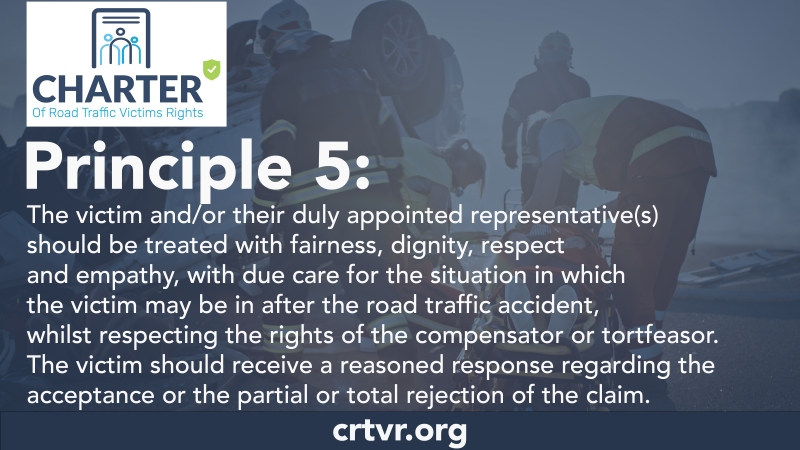Principle 5:
The victim and/or their duly appointed representative(s) should be treated with fairness, dignity, respect and empathy, with due care for the situation in which the victim may be in after the road traffic accident, whilst respecting the rights of the compensator or tortfeasor.
The victim should receive a reasoned response regarding the acceptance or the partial or total rejection of the claim.
It would be fair to say that this principle, along with Principle 4, can be considered core to the purpose of the Charter of Road Traffic Victims’ Rights. Both principles seek to place the values of respect at the centre of handling a victim’s claim and their situation.
This principle takes that focus even further, emphasising additional values of ‘fairness’, ‘dignity’ and ‘empathy’. Put simply, the Charter is seeking to ensure that a humane approach is built into the process of handling claims from victims, and that a spirit of partnership becomes part of that interaction between both the victim and the compensating party.
This principle wants to underline that the victim – having been involved in an accident and suffered damages which they are not responsible for – should not be treated in a defensive or opposing manner. Rather it wants to encourage the compensating party (insurance providers, Green Card Bureaux, Guarantee Funds, Compensation Bodies, etc) to work with the victim towards ensuring the correct compensation is provided for the damage suffered.
If this is done in the context of mutual respect, the process will run much more smoothly, which is in the interests of all parties.
Looking more deeply at those key values, this principle seeks to ensure victims should receive:
- Fairness: The compensation process is designed to give the victim what they are entitled to, which means compensation which is in line with the law and the standard application of rules. That does not mean they receive everything they ask for, but they should receive what they are due.
- Dignity: The Charter wants the process to safeguard the dignity of victims. Often this is a question of how the compensating party interacts with the victim. A sense of partnership helps affirm a victim’s dignity much more readily than when the approach is adversarial. This value is particularly important if the victim has suffered a personal injury and their physical integrity is affected. Such victims do not need additional burdens placed on them through the claims process.
- Respect: If the compensator starts from the mindset of equality and treats the victim as a human partner, it helps generate an atmosphere of respect. When the victim feels respected, they are much more likely to reflect that in their engagements with the compensator too. This helps the compensation process avoid a sense of conflict and instead encourage a spirit of cooperation.
- Empathy: Anyone can be the victim of the accident. This is at the core of the Charter and it is a mindset that it hopes everyone involved in the compensation process can adopt. Compensators should try to imagine and understand the situation the victim is in and that should be reflected in their interactions with the victim. This doesn’t mean pampering the victim, just showing them appropriate awareness and consideration. By emphasising the need for empathy, the Charter wants those involved in handling claims to understand they are dealing with a human being and not just data on a page or screen.
The last of those values is further underlined when the principle mentions “due care for the situation in which the victim may be in”. The Charter recognises that interacting with a person who has suffered severe personal injuries in a road traffic accident requires a different approach than someone whose claim is limited to damage done to their vehicle.
Also mentioned in this principle is the recognition of the “duly appointed representative(s)”. Unlike those who work for the compensating party, victims are not professionals and many will not have experience in the landscape of claims handling.
That can be very challenging, especially given the rules around liability, claims handling and compensation, which are often technical and complicated. To help address these gaps in the victim’s expertise, the Charter recognises the role of their ‘appointed representatives’ such as lawyers, legal aid insurers, claims handlers or other professional supports – and the role they play in assisting the victim.
This principle also seeks to recognise the rights of the compensator. Submitting a claim is always a two way process and the party providing compensation has rights too. That means appropriate compensation should be provided to which the victim is entitled. However, that doesn’t mean giving the victim everything they demand without question. Fairness here is also key. Again, the Charter wants to encourage this whole process to become a partnership of cooperation and that means respect should be shown on both sides.
Thankfully this seems to be the gradual evolution in the process of claims handling, with more and more of those involved in the handling of victims’ claims moving towards the partnership model as envisioned in the Charter. While there is certainly room for more progress and it can’t yet be said that all situations move forward without friction, there is definitely a move in the right direction. Ultimately this helps create a greater degree of satisfaction at the end of the process for the victim and the compensator alike.
Which is exactly what Principle 5, and the Charter of Road Traffic Victims’ Rights in its totality, aim to achieve.


